This Practice Note is the first in a series aimed at improving the commercial management of construction projects by guiding and sub-contractors , contractors on best practices. Authored by Len Bunton, Sean Bradley, and Mark Holden-Smith, all experienced construction consultants, it highlights key recommendations from the CICV Best Practice Guide (BPG).
Importance of Notices in Construction Contracts
One of the most common pitfalls for contractors is failing to issue contractual notices at the required time. Notices play a crucial role in protecting entitlements to extensions of time (EOT), additional payments, and other contractual rights.
Key Steps to Ensure Compliance with Notice Requirements
To avoid disputes and safeguard contractual rights, contractors should:
- Read the Contract Carefully
- Identify when a notice must be issued. E.g. within 14 days.
- Determine who the notice should be sent to.
- Understand how the notice must be issued (e.g., email, recorded delivery).
- Maintain Proof of Service
- If sent by email, enable read and delivery receipts.
- If sent by post, keep recorded delivery proof.
- Educate Project Teams
- Ensure site management, contract management, and commercial teams understand the notice requirements.
- Train supply chain partners on their responsibility to issue notices promptly.
Consequences of Failing to Issue Notices
Failure to issue a timely and compliant notice can invalidate a contractor’s entitlement. A notable legal precedent is the Scottish Court of Session case, FES Limited v HFD Construction Group [2024] CSOH 20, where a claim for an extension of time was rejected because the contractor failed to provide a notice within the stipulated timeframe. The court ruled this requirement was a “condition precedent”, meaning that compliance was mandatory for any claim to be valid.
A condition precedent in contract law is an event that must occur before a party is entitled to a particular contractual right or benefit. Ignoring such conditions can lead to the automatic loss of claims, even if the contractor has a legitimate entitlement.
Common Situations Requiring Notices
Notices are typically required for:
- Variations (changes to work scope).
- Late receipt of information impacting progress.
- Potential delay events.
- Disruption affecting work schedules.
- Loss and expense claims arising from employer-related delays.
- Unforeseen events beyond the contractor’s control.
Applicability to Different Contract Forms
This guidance primarily applies to JCT and SBCC contracts but is also relevant to NEC4 contracts, which contain a dedicated Communications section outlining notification requirements. Also, almost every Subcontract will contain condition precedents in relation to notices.
Final Advice
Contractors should not be concerned about issuing multiple notices. Doing so is simply complying with contractual obligations and protecting their legal and financial position. Employers, contract administrators and contractors should recognise the necessity of issuing notices and acknowledge them accordingly.
By following these best practices, contractors can improve commercial project management, avoid disputes, and ensure compliance with contract provisions.
You can access the full guide here
Additional guidance notes




















